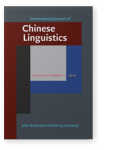Q-adjectives in Mandarin and the interpretation of nominal phrases
In Mandarin, predicative quantity adjectives (henceforth, Q-adjectives; e.g.,
duō ‘many’ and shăo ‘few ’; henceforth, predicative Q-adjectives), but not ordinary
adjectives (e.g., cōngmi̇́ng ‘smart’), may influence the interpretation of the nominals they are predicates of;
while the Mandarin counterpart of speaking of the students one taught, Zhangsan many can (and only can) mean that
the students that Zhangsan taught are many, that of speaking of the students one taught, Zhangsan smart can only
mean that Zhangsan, but not the student/s that Zhangsan taught, is/are smart. This paper is to show how this previously unnoticed
contrast may be accounted for in current theories of degree syntax and semantics. The proposal is couched on Solt’s (2015) analysis of Q-adjectives, according to which measurement of cardinality is introduced via a
covert functional head rather than the Q-adjectives per se. The main idea is that in Mandarin the covert
functional head that introduces measurement of cardinality semantically encodes a contextually provided function from individuals
to individuals. Crucially, although the content of this function is context-dependent, various syntactic and semantic factors may
be at play.
Article outline
- 1.Introduction
- 1.1Mandarin Q-adjectives and the association effect
- 1.2The quantity vs. quality distinction
- 1.3The association effect in a comparative
- 1.4Not due to deletion; not due to coercion
- 1.5Roadmap
- 2.Locating the source of the association effect
- 2.1The rise of the association effect
- 2.2Predictions and seemingly loose ends
- 3.The association effect in a comparative
- 3.1
e-givenness and the association effect
- 3.2Direct analysis and the association effect
- 4.Some theoretical and empirical implications
- 4.1The context dependency of the association effect
- 4.2The Q-adjectives vs. ordinary adjectives
- 4.3Predication vs. prenominal modification
- 5.Conclusion
- Notes
-
References
References (28)
Barker, C.
(
1995)
Possessive Descriptions. CSLI Publications, Standford, CA.

Barker, C.
(
2011)
Possessives and relational nouns. In
Maieborn, C.,
Portner, P., and
von Heusinger, K., editors,
Semantics: An International Handbook of Natural Language Meaning, volume 21, pages 1109–1130. De Gruyter Mouton, Berlin.

Bresnan, J. W.
(
1973)
Syntax of the comparative clause construction in english.
Linguistic Inquiry, 4(3):275–343.

Creswell, M.
(
1976)
The semantics of degree. In
Partee, B., editor,
Montague Grammar, pages 261–292. Academic Press., New York.


Erlewine, M. Y.
(
2007)
A New Syntax-Semantics for the Mandarin bi-Comparative. Master thesis, University of Chicago.

Gibson, E. and Wu, H.-H. I.
(
2013)
Processing chinese relative clauses in context.
Language and Cognitive Processes, 28(1–2):125–155.


Hackl, M.
(
2000)
Comparative Quantifiers. Doctoal dissertation, Massachusetts Institute of Technology.

Heim, I.
(
2006)
Little. In
Gibson, M. and
Howell, J., editors,
Semantics and Linguistic Theory XVI, volume 161, pages 35–58. Cornell University, Ithaca, NY.

Hsieh, I.-T. C.
(
2015)
Long-distance reflexives, blocking effects, and the structure of mandarin comparatives.
Syntax, 18(1):78–102.


Kayne, R. S.
(
2005)
A note on the syntax of quantity in english. In
Kayne, R. S., editor,
Movement and Silence, pages 176–214. Oxford University Press, New York.


Kratzer, A.
(
2012)
Modals and Conditionals: New and Revised Perspectives. Oxford University Press, Oxford ; New York.


Lin, J.-W.
(
2009)
Chinese comparatives and their implicational parameters.
Natural Language Semantics, 17(1):1–27.


Liu, C.-S. L.
(
1996)
A note on chinese comparatives.
Studies in the Linguistic Sciences, 261:217–235.

Liu, C.-S. L.
(
2011)
The chinese bi comparative.
Lingua, 121(12):1767–1795.


Maienborn, C.
(
2001)
On the position and interpretation of locative modifiers.
Natural Lan-guage Semantics, 9(2):191–240.


Merchant, J.
(
2001)
The syntax of silence: Sluicing, islands, and the theory of ellipsis. Oxford University Press.

Morzycki, M.
(
2013)
Modification. Book manuscript. In preparation for the
Cambridge University Press series Key Topics in Semantics and Pragmatics.

Nakanishi, K.
(
2007)
Measurement in the nominal and verbal domains.
Linguistics änd Philosophy, 30(2):235–276.


Partee, B. H.
(
1997)
Uniformity vs. versatility: The genitive, a case study. appendix to theo janssen (1997), compositionality. In
van Benthem, J. and
ter Meulen, A., editors,
The Handbook of Logic and Language, pages 464–470. Elsevier, New York.

Rett, J.
(
2008)
Degree modification in natural language. Doctoral dissertation, Rutgers University.

Sawada, O. and Grano, T.
(
2011)
Scale structure, coercion, and the interpretation of measure phrases in japanese.
Natural Language Semantics, 19(2):191–226.


Schwarzschild, R.
(
2006)
The role of dimensions in the syntax of noun phrases.
Syntax, 9(1):67–110.


Solt, S.
(
2015)
Q-adjectives and the semantics of quantity.
Journal of Semantics, 32(2):221–273.


de Swart, H.
(
1998)
Aspect shift and coercion.
Natural Language & Linguistic Theory, 16(2):347–385.


von Stechow, A.
(
2005)
Temporal comparatives: früher ‘earlier’/später ‘later’.

Wellwood, A., Hacquard, V., and Pancheva, R.
(
2012)
Measuring and comparing individuals and events.
Journal of Semantics, 29(2):207–228.


Xiang, M.
(
2005)
Some topics in comparative constructions. Doctoral dissertation, Michigan State University, East Lansing, MI.

Cited by (1)
Cited by 1 other publications
This list is based on CrossRef data as of 3 july 2024. Please note that it may not be complete. Sources presented here have been supplied by the respective publishers.
Any errors therein should be reported to them.
